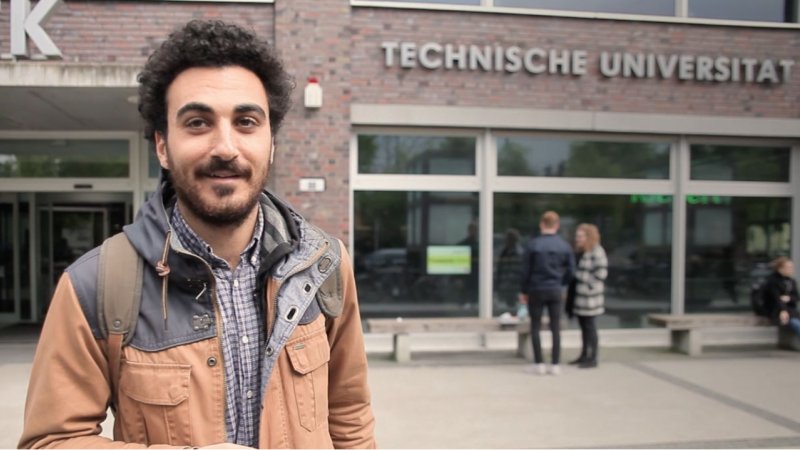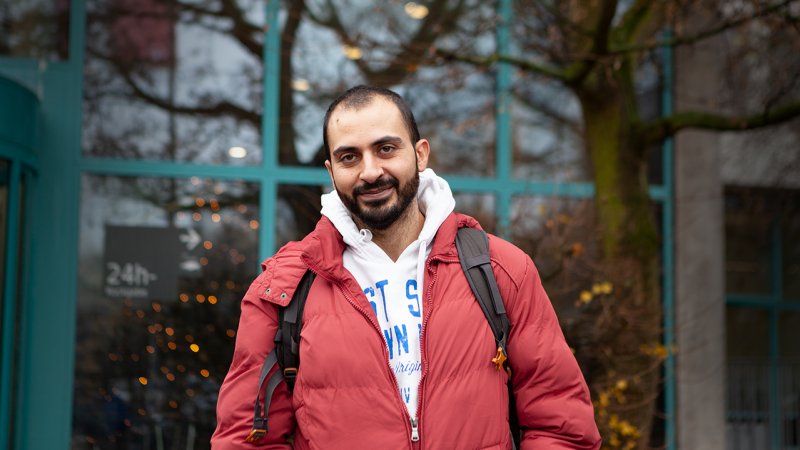
Going to university can be a worthwhile choice for your future career; nevertheless, money is often tight when you are in the university. In Germany, a state fund has been designated under the Federal Training Assistance Act (BAföG) to help the students with the financial burden. According to the act, if you or your parents have a small income (and you are not in Germany on a student visa), under certain circumstances, you can apply for BAföG and receive an allowance from the state during your studies.
Please note: BAföG is generally also available to trainees and schoolchildren. On this page, you can find out more about BAföG for (university) students.
*The information on this page was updated with the kind support of Prof Matthias Knuth from the Association for the Integration of Highly Qualified Immigrants - INTEZ e. V.
The term BAföG stands for “Federal Education Funding Act” (“Bundesausbildungsförderungsgesetz”), which is a state-funded financial aid programme. Under certain circumstances, every student who cannot finance their studies themselves (or with the support of their parents, partner/spouse) can apply for BAföG. Students cannot receive assistance from the Jobcenter or Social Welfare Office- so BAföG plays an essential role in enabling many students in Germany to continue their studies. BAföG consists of two parts: a grant (which you do not have to pay back) and a zero-interest government loan. That means after you finish your studies, you will only have to pay back part of the money you have received without any interest.
Whether you receive BAföG depends on your age, legal residence status and your previous qualifications.
Age:
If you have already reached the age of 45 at the beginning of your programme, in principle, you will not be eligible for BAföG. There are exceptions, however - if:
- you were unable to start or complete your studies, for instance, because of the situation in your home country, or
- you obtained your Abitur in Germany and started university immediately afterwards,
you can apply for BAföG despite being over 45 years of age. Learn more at bafög.de and in the "BAföG-Ratgeber" provided by INTEZ e. V.
Residence status:
In principle, if you are legally allowed to reside in Germany -even without a spot in a university- and are registered in a higher education institution, you essentially meet the legal residence requirements for BAföG. That means you cannot apply for BAföG if you have come to Germany on a student visa (§16b Residence Act).
You can find out whether you can apply for BAföG with your residence permit in §8 BAföG. If the paragraph according to which your residence permit is issued is mentioned there, it means you meet the legal residence requirements for BAföG.
If you have fled to Germany, the following applies to you:
- If you are recognised as entitled to asylum, refugee status or subsidiary protection, you can apply for BAföG
- War refugees from Ukraine can apply for BAföG as long as they have a residence permit in accordance with § 24 Residence Act.
- If you have a "national ban on deportation" or "Duldung" or have come to Germany under the family reunification programme, you can only apply for BAföG after 15 months. For the first 15 months of your stay in Germany, you will continue to receive asylum seeker benefits if you start to study.
- If you have a temporary stay permit ("Aufenthaltsgestattung "), i.e. you are still in the asylum procedure, you cannot apply for BAföG. However, you are allowed to study and continue to receive asylum seekers benefits. Please note: If you are later recognised as a person entitled to asylum rights, refugee status or subsidiary protection, you will no longer be entitled to asylum seekers' benefits. So the payments will stop immediately. Also, as a student, you will not be entitled to support from the Jobcenter. That is why it is best to apply for a so-called "preliminary decision" ("Vorabentscheid") beforehand so that your BAföG application can be decided faster. You can find out more in the section "Where do I apply for BAföG?".
Previous Qualifications:
If you have already studied abroad, you can only receive BAföG under certain conditions, i.e. when:
- Your education abroad is not "institutionally equivalent" to studying in Germany. This is the case, for instance, if you only took part in evening classes or part-time programmes abroad. It can also be the case if your studies lasted less than three years or in a programme for which you did not need a university entrance qualification.
- You have a Bachelor's degree and now want to attend a Master's programme.
- You could not finish your studies abroad and now want to continue studying. Please note: If you're going to study another subject, it becomes somewhat more complicated. You can find out more in the section "I did not complete my studies abroad. Can I study another subject?"
- The qualifications you have obtained abroad do not enable you to find an academic profession in Germany (although you could, in principle, work in an academic profession in your home country), and when you were studying abroad, you did not have the right to reside (with one of the residence titles mentioned in §8 BAföG) and study in Germany.
Important: Only students under the doctorate level who do not have another higher degree can receive BAföG. That means you can only get BAföG if you have a Bachelor, Master, state examination (Staatsexam) or Dual Programme certificate. To obtain a doctorate, you need to find other funding options.
You can find out more about existing funding options (and exemptions designated for people with an immigration background) in the "BAföG-Ratgeber" section offered on the website of INTEZ e.V.
It is common for students to get rejected by the BAföG office without sufficient reasons; it is, therefore, essential that you know your rights. And for that, you can benefit from counselling. If your BAföG application is rejected because of your abroad-obtained degree or your desire to change your subject, you can contact the INTEZ association via info@intez.de and ask for advice.
Whether you can still receive BAföG after changing your subject depends on the number of semesters you have had so far. In principle:
- If you have studied abroad for less than four semesters, you can receive BAföG even if you change your subject.
- If you have already studied for five semesters and want to change, you can only receive BAföG if you have a "substantial reason" for switching to another subject. A "substantial reason" could, for example, be that you were not able to choose your subject in your home country freely.
- If you have already studied for more than five semesters, you can only receive BAföG if you have an "irrefutable reason" ("unabweisbaren Grund") for changing your subject. That could be the case, for example, if you cannot continue your music studies because of an injury or in case you cannot continue your medical studies because of a trauma. There are also court decisions entitling people who could not continue their studies because of displacement/flight to receive BAföG even if they change subjects. The verdicts, however, have been issued for the specific cases in question, and there is no guarantee that other judges will rule the same way.
Please note: A draft law is currently being discussed that would raise these semester limits by 1 semester each. (as of May 2024)
If your BAföG application is rejected because you have changed your subject, you can contact the INTEZ association via info@intez.de.
To receive BAföG, you must fill and submit an application (with many pages) to the BAföG office responsible for your university. In principle, the address of the relevant BAföG office will be available on your university’s website and at studierendenwerke.de. You also must attach various documents and pieces of evidence, namely bank statements and your enrolment certificate, to the application. You can also apply online– learn more on bafög.de.
Good to know: The BAföG offices do not process applications digitally. We recommend that you download and use the forms provided online to apply for BAföG. You can fill in the forms on your computer and save and print them. Before submitting the application, it is helpful to send it to friends or acquaintances who already have experience with BAföG to make sure everything has been filled in correctly.
Please note that the application can only be submitted after enrolment at the university. In more complex cases (e.g., if you have obtained a degree abroad), you can apply for a so-called "preliminary decision" ("Vorabentscheid") at the BAföG office. This way, before you enrol, you can clarify whether you have a chance of receiving financial support or not. You can find out, for instance, whether you could be exempt from the age limit or whether you will receive funding for a bachelor's degree despite having a bachelor's degree from abroad.
If you have difficulties with the application, you can ask the BAföG office or the "Studierendenwerk" for help. You can also seek support and advice from the General Student Committee (AStA) at your university.
If your BAföG application is approved, you will receive a monthly allowance, the amount of which depends on your financial resources. The maximum rate paid per month is currently €934 (as of 2024).
There are certain allowances that you can read about at bafög.de. If you exceed these allowances, you will receive less than the maximum rate.
If you, for instance, earn an income higher than €523,42 per month (as of 2024) from a part-time or holiday job, you will receive less BAföG. Plus, savings, property and other financial assets are also taken into account. Furthermore, your parents' income is also considered unless you are already over 30 or have been financially independent of your parents for at least 5 years.
Processing your application takes a while, so one often receives the first monthly payment after starting with his/her studies. Nevertheless, the date of the application is considered the beginning of payments. That means the first payment is often a large sum and includes the payments from the few months since you have applied. Your local Office for Promotion of Education ("Ausbildungsförderung") can provide you with more information. You can find their address on studentenwerke.de.
You will only receive BAföG for the standard period of study. How long the standard period of study is depends on your subject and your university. If you need more time, you can apply for an extension. However, extensions are usually only granted for 1 or 2 semesters.
In the future: The draft bill for the BAföG reform 2024 plans to introduce a so-called flexibility semester. This is intended to give students the one-off opportunity to receive funding for an additional semester beyond the maximum funding period without having to provide a reason. The flexibility semester is to be introduced in the winter semester of 2024/2025.
The repayment obligation begins five years after the end of the maximum funding period, i.e. usually five years after the end of your regular study period.
Shortly before the end of these 5 years, you will receive a repayment notice from the Federal Office of Administration per post. Please make sure that the Federal Office of Administration is always informed of your current address. Otherwise, you face dunning fees.
In principle, you have to repay a maximum of €10,010. The monthly instalment is usually €130. Instead of paying €130 each month, however, you pay €390 every three months. Please Note: If your income is low after graduation, and you cannot pay the instalments, you can also request an exemption from the BAföG repayment ("Freistellung von der BaföG Rückzahlung") for a maximum of 10 years.
You can also repay the entire due amount at once and benefit from a discount. That means, altogether, you will pay back less. If you -despite all efforts - fail to repay your loan within 20 years fully, the remaining debt can be waived.
When you get exempt from repayment due to your low income after graduation, however, your repayment period will be extended to a maximum of 30 years. This means that your remaining debts will be cancelled after 30 years.
Please note: You will have to repay this loan even if you decide to leave Germany.
No. If you are enrolled at a university for a full-time programme, you cannot receive any money from the Jobcenter. The Jobcenter is only responsible for people who are available for full-time employment. That means you cannot seek help from the Jobcenter even if your BAföG application is rejected. Your spouse or underage children, however, can still receive help from the Jobcenter.
The draft bill for the planned BAföG reform 2024 provides for a state aid called "Studienstarthilfe". This is a one-off grant of €1,000 at the beginning of studies. The money is intended to make it easier for young students from low-income households to start their studies. The grant is designated to help young students afford a laptop, a deposit for rent or books and such. The grant does not have to be repaid. "Studienstarthilfe" is to be introduced for the 2024/2025 winter semester.
"Studienstarthilfe" Requirements
Students who:
- are enrolling at a university for the first time,
- are not older than 25 years of age and
- have received “Bürgergeld”, social benefits, asylum seeker benefits, the so-called “Kinderzuschlag”or housing benefits in the month prior to university enrolment
can receive "Studienstarthilfe".
Good to know: You do not have to be entitled to BAföG in order to receive the grant.
Please note: Prospective students who are new in Germany, and refugees in particular, are at risk of being excluded from "Studienstarthilfe". These are often individuals who had to invest much time to immigrate to Germany and learn the language. That is why many of them are older than 25. In addition, a considerable number of them may have already started or completed a degree programme abroad. This means that they won’t be enrolled at a university for the first time if they manage to start university in Germany. Unfortunately, the draft bill for the planned BAföG reform 2024 does not take issues as such into account.
If you have problems filling out your BAföG application, you can contact your student union and get help. If you have problems with the BAföG office, you can ask the General Student Committee (AStA) at your university for help.
If your BAföG application is rejected, you can contact a law firm specialising in social law. Your lawyer can then object to your rejection letter or - and if the object does not help - go to court. You can find a law firm near you at anwaltauskunft.de. According to the law, people with little or no income should also be able to claim their rights. Therefore, the so-called "Prozesskostenhilfe" (legal aid) has been designated in Germany. "Prozesskostenhilfe" means for certain legal proceedings, the state covers the costs for the lawyers and the court when you cannot afford to do so yourself. You can find out more in our chapter "Legal aid".
Important: If your BAföG application is rejected because of the degree you have obtained abroad or a subject change, you can contact the INTEZ association at the email address info@intez.de.
As a student, you are not allowed to receive any benefits from the Jobcenter. If you do not tell the Jobcenter that you have started to study and continue to receive benefits from them, you will have to repay the money received upon detection.
Here you can find plenty of advice on how to obtain BAföG despite having a previous qualification from your country.
Here you find information specifically tailored for refugees concerning higher education in Germany - in various languages.



